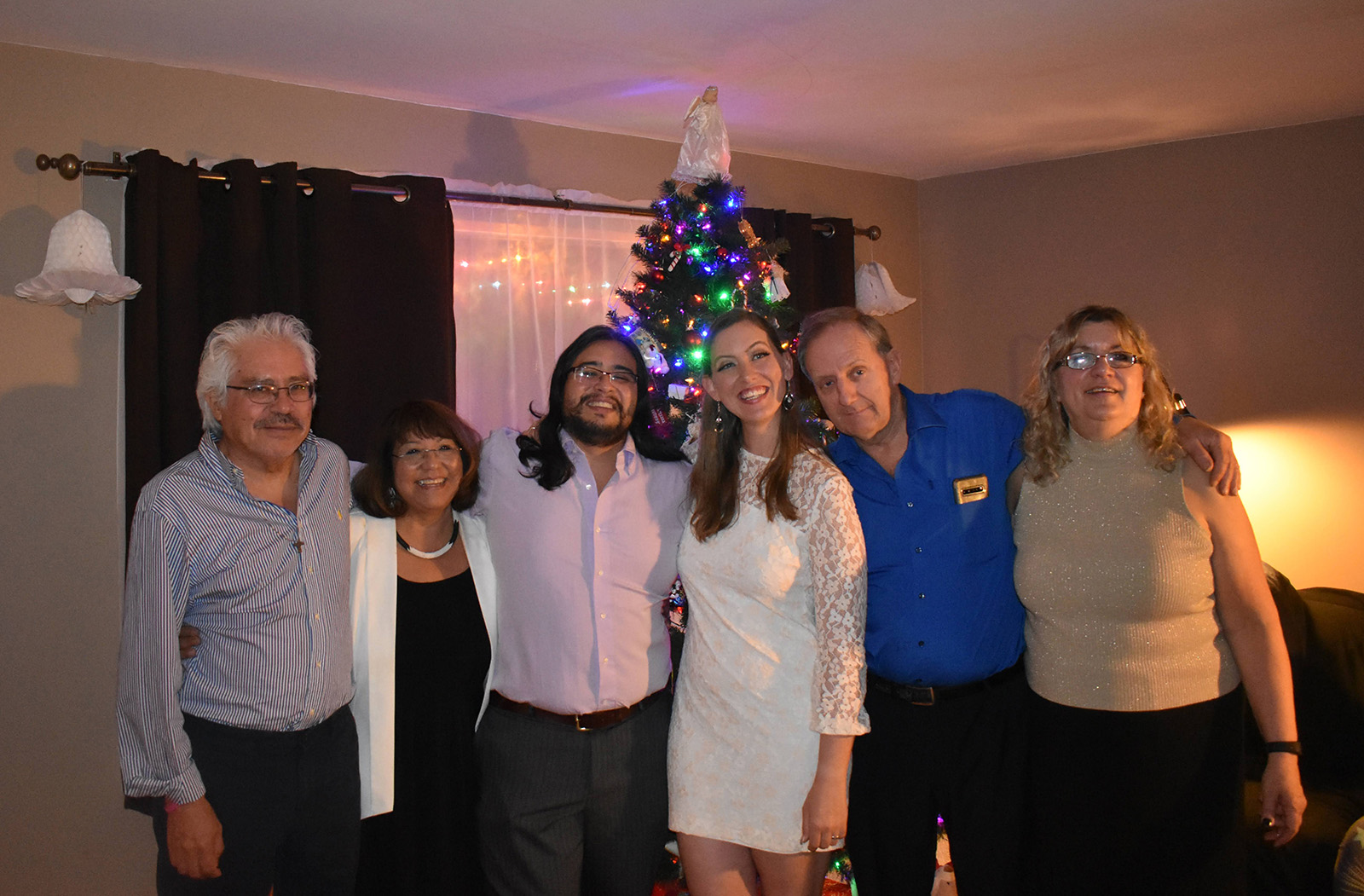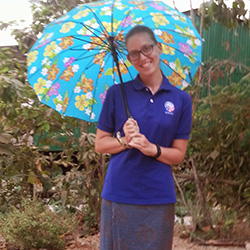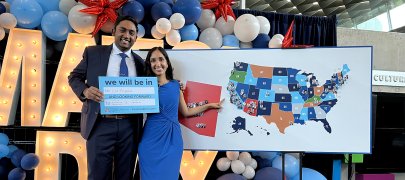
White Coat Profile: Mary “Franki” Walsh

The White Coat Ceremony marks the first time a medical student will don his or her white coat, the defining symbol of a physician. The coat bestows a great honor on each student, and with it comes a responsibility to uphold the trust of every patient they will encounter. The Class of 2027 will receive their white coats on July 14 during a ceremony that begins at 3:30 p.m. in the West Ballroom of the Phoenix Convention Center downtown.
Meet Franki Walsh
Franki Walsh was born and raised in Northern New Jersey, but she opted to attend college at the University of Southern California (USC) in Los Angeles.
Her path to medical school was a non-traditional one. She graduated in 2011 with a bachelor’s degree in Gender Studies and English – Creative Writing. She then served as a Peace Corps volunteer in Cambodia from 2013–2015.

Her work with underrepresented people both at home and abroad led her to obtain a master’s in public health (MPH) with a certificate in Health Promotion from Columbia University Mailman School of Public Health.
Walsh and her husband then moved from New York City back to Phoenix, where she began to seriously pursue pre-medical studies. While working for Maricopa County as an epidemiologist — and having given birth to a son — she earned a bachelor’s degree in Biochemistry from Arizona State University.
Walsh notes that these experiences and accomplishments would not have been possible without the support of her parents, husband and in-laws, especially after having their son.
Path toward Medicine
What was the spark that led you to become a physician?
I have always had an interest in health and what makes people tick, but never really saw it as a viable option for me — for a long time, at least. My mom gave me a copy of Our Bodies, Ourselves (an edition that was published in 1987 — two years before I was born!) when I started to go through puberty. I read that book cover to cover multiple times, but I had always been intimidated by the idea of a career in medicine — so many of the physicians I knew as a kid had parents who were doctors themselves.
My mom and dad are not doctors, but they are two of the people that inspire me the most in the world. I got my love of volunteering and my empathy from them. They are the type to take the shirt off their backs and give it to anyone who might need it.
This care for others, combined with a rediscovered love of science after graduating from USC, led me to explore medicine more seriously as a career path. The turning point was taking a class with an emergency medicine physician during my master’s program. This doctor showed an immense amount of care about his impact in the world and on patients, but he was also incredibly down to earth. At that point, I realized physicians are not superhuman — you can be totally "normal" and still be a doctor. I do not know why it did not click before then, but I'm glad I had the time and space to explore other careers before starting down this path. I think a lot of those experiences will help me be a more well-rounded physician.
Did you do any volunteering in health fields prior to medical school?
A lot of my health-related volunteering is more geared toward public health. I did HIV outreach during my first round of undergrad, and before leaving for Peace Corps, I trained to be a full-spectrum doula; so, I saw the importance of reproductive health options. In the Peace Corps, I was a Community Health Education volunteer, mostly focused on prenatal work, but I did tie-in messaging on non-communicable diseases, HIV, water, sanitation and hygiene.
I also helped put together a girls' empowerment camp for my province and developed a lesson on consent for the camp. My AmeriCorps VISTA service was focused on working with justice-involved populations around Maricopa County, spreading the message about expanded Medicaid and the importance of preventive care. I also did my MPH practicum in Arizona, writing a public health curriculum for a class at Tohono O'odham Community College. Thus far, I have found my greatest impact to be in teaching health-related topics.
The College of Medicine – Phoenix
Why did you choose the College of Medicine – Phoenix?
I chose the University of Arizona College of Medicine – Phoenix for two reasons: 1) I absolutely love the curriculum and the opportunities available and 2) the location. My husband and I bought a house in Phoenix in June 2021, knowing there was a possibility we might have to move. Luckily, it all worked out on the "staying in Phoenix" front. Also, the College of Medicine – Phoenix is across from one of the best coffee shops in town, so that helps.
As for the curriculum, I wrote in my second application for the college something along the lines of, "If I had to design the perfect medical school for me, College of Medicine – Phoenix would be close to what I imagine." I am a huge fan of the scholarly project, I love the integration of doctoring and clinical care, and I am overjoyed at the opportunity to apply for the Primary Care Scholars program.
As a mom in my mid-30s, who also has a passion for public health, I applied to medical school knowing I wanted to become a family medicine physician, so I'm excited by all the opportunities available at this college to deepen my knowledge related to that field. Additionally, I have been a COVID epidemiologist for Maricopa County for the last three years, so getting to "extend" my care for Arizonans, and more specifically Phoenicians, by becoming a physician in Arizona is pretty much a dream come true.
What excites you most about beginning medical school?
I love school and I love learning, so I am excited to dig deeper into topics that were covered on a more surface-level during my pre-med classes. I am also happy to see all my hard work come to fruition. Last year was my second time applying to medical school, which helped me affirm that this was really the career for me.
I am excited to move beyond the "dreaming about medicine" stage into the "digging in" stage of learning the topics that will most help to contribute to better knowledge on rotations in third- and fourth-year — and beyond. And, of course, as a very social person, I am excited to broaden my circle and get to know my new classmates and fellow future doctors!
Significance of the White Coat
What does the white coat mean to you?
The White Coat signifies three things: 1) the culmination of the preparatory phase, 2) the beginning of a more intense bit of studying and, most importantly, 3) the responsibility of the profession.
Putting on the white coat is knowing that I have accomplished something I have worked very hard for over the last few years, but also recognizing it is just the beginning of the road. Aside from the work, the white coat signifies that I must be more aware of how I am treating those around me, not just my patients.
Being a physician comes with a lot of responsibility — inside and outside of work — so, to me, it signifies that I am ready to be an advocate for my patients and for health justice as I move forward in this field.
About the College
Founded in 2007, the University of Arizona College of Medicine – Phoenix inspires and trains exemplary physicians, scientists and leaders to optimize health and health care in Arizona and beyond. By cultivating collaborative research locally and globally, the college accelerates discovery in a number of critical areas — including cancer, stroke, traumatic brain injury and cardiovascular disease. Championed as a student-centric campus, the college has graduated more than 800 physicians, all of whom received exceptional training from nine clinical partners and more than 2,700 diverse faculty members. As the anchor to the Phoenix Bioscience Core, which is projected to have an economic impact of $3.1 billion by 2025, the college prides itself on engaging with the community, fostering education, inclusion, access and advocacy.


